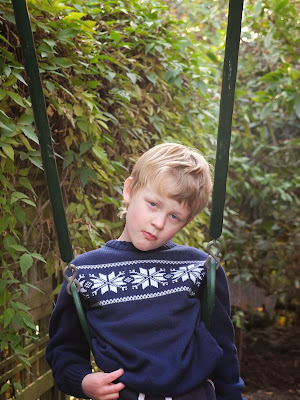I've been suspecting a growth spurt. And sure enough, his pants reveal just a bit too much of his socks. I don't have to tighten his elastic waistbands as much.
And with the same momentum, Soren is showing huge leaps in development. We see this at school, in therapy, and at home. His self-management is so much better: He's able to sit and attend to tasks for longer periods of time. He is able to find activities that are calming to him, like swinging and hiding in the covers, and he seems to know when he needs to recharge. And his transitions (especially relinquishing the iPad to me) are downright smooth.
His ABA therapy at home has suddenly become really productive, forcing us to create new goals for him because he's mastered so many, like recognizing numbers, matching words to pictures and words to words, and knowing pretty much every animal's name. This is after what seems like a whole year of stagnation.
I was feeling pretty hopeful, like something had clicked. But then I attended Soren's reassessment meeting last week, and I started to lose my high about Soren's development. This reassessment happens every three years so that the school district can ensure that he still qualifies for the services he receives (in other words, does he still have deficits). There's a report circulated, then a meeting to discuss it. I quickly scanned the bulk of the report one night, and a few phrases jarred me:
"He tends to slump in his chair, is not aware of personal space, touches people to the point of irritating them, and moves slowly when accomplishing tasks."
"Soren is demonstrating significant challenges performing many of the functional tasks required to be successful in the school environment."
But reading them can be upsetting, even shocking. Sometimes I forget the challenges and focus on the many accomplishments (which is what I think I should do, no?). After I read the report, I questioned myself, and I found myself doubting the progress, the spurts. Did I really see them? Is there any progress? Are there just challenges here?
Of course I don't want to focus only on progress. I think there's a dark corner of the autism world that is focused only on upward progress--change, improvement. In constantly evaluating and focusing on eliminating deficits, there's a message that we only value the autistic child when he or she is "improving." That status quo is not sufficient. I don't want Soren to think that his periods of focusing inward make him any less valuable, just as his growth spurts don't make him any more lovable. Am I getting too excited about some possible gains?
So I wade my way through the report's candor, my self-doubt about what I'm seeing, and caution about valuing any growth too much. It's taken me a week to mull it all over, but I'm finally able to hold the two truths at the same time: Yes, Soren has some huge challenges that require a full slate of school services. But (and) yes, Soren is experiencing huge gains in all sorts of ways, and a bunch of us have noticed. Both statements are true. And neither one makes me value Soren any more or any less.





































